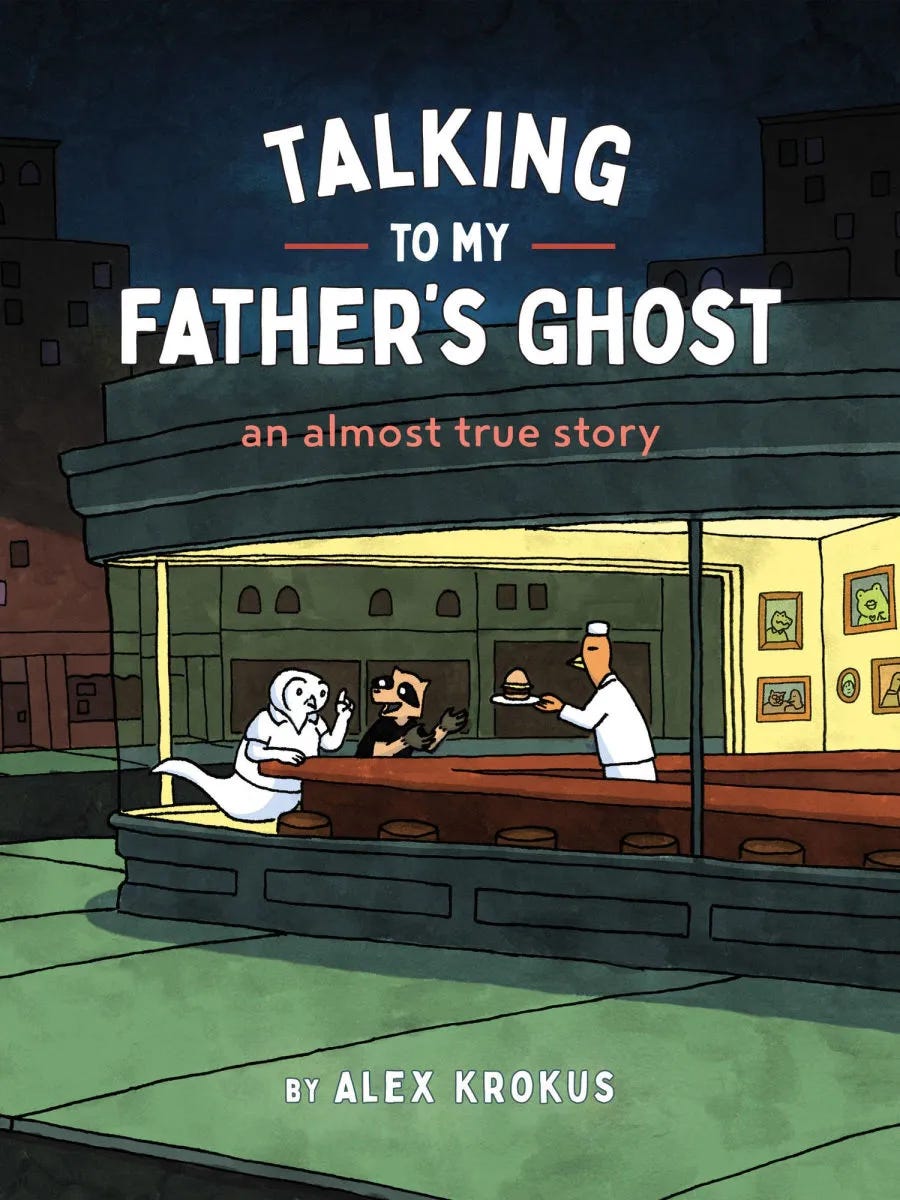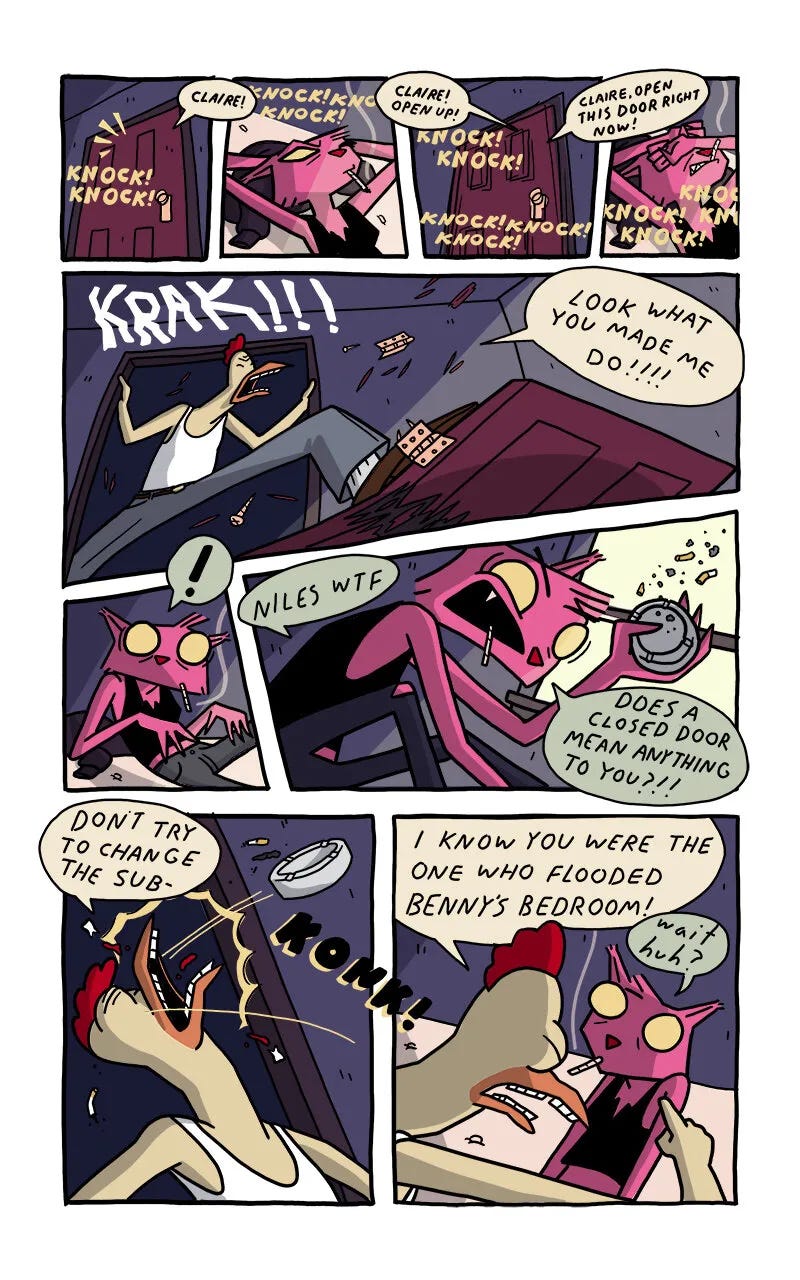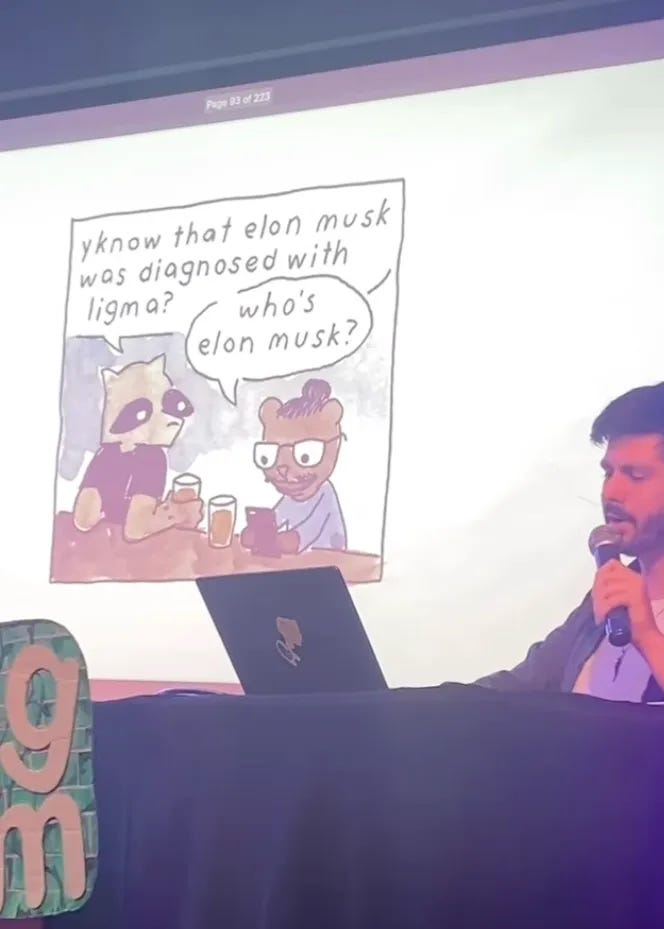Alex Krokus - Creators First Spotlight
At times a human man, at times an internet raccoon, cartoonist Alex Krokus expertly captures the humor of daily life and the weirdos that make it all worthwhile.
The first time I got to sit down and talk to Alex was at a bar in Brooklyn shortly after we started discussing his animated series. When the conversion drifted into talking about Estonia I knew I found a kindred spirit and someone that I needed to work with.
Over a year later this still rings true. Alex has been one of the funnest people I have ever collaborated with. The way he is able to ‘yes and’ our ideas while keeping his vision clear and distinct has never ceased to impress me.
For someone who seems to always have 8 plates spinning, he is still able to be present and incredibly supportive of fellow creatives in his community. He’s just a really chill guy!
His webcomic ‘Loud & Smart’ never fails to make me laugh and I cannot wait to read his debut graphic novel, Talking to My Father’s Ghost, coming this August from Chronicle.
-Flip Sarta
What's your story?
My name is Alex Krokus. I'm a cartoonist who studied illustration. I taught myself animation after graduating college, and through being in the industry and making my own films I discovered a love of storytelling.
What's the earliest piece of media that made you think “I want to make something like that one day?”
The earliest thing I could think of is the comic strip Calvin and Hobbes. I read and loved a lot of strips as a kid, like Garfield, FoxTrot, and Zits, but as well as being funny, Calvin and Hobbes had this sentimentality to it that I never really saw in the medium before or since. To be honest, I don't think we've ever gotten another Calvin and Hobbes, despite my best efforts.
Although it's not the earliest and it's definitely cringe, On The Road by Jack Kerouac had a big influence on me in college. Go ahead, execute me. The story is fine, but I really connected with how self-indulgent it was. I walked away from that book thinking “Hey, I can do that.” And after that, for all of my 20s, I became a very obsessive journaler.
I traveled a lot. I toured the country with my DIY folk punk band. Once again, execute me. But while I did all of that, I wrote all the time. I had stacks of sketchbooks with writing in it. And I've never revisited that writing, but I've been meaning to because there might be a good story in there, if any of it makes any goddamn sense. But I haven't confronted that yet.
What's your process like?
If it's conversational, I like them short and sweet, more like vignettes or anecdotes. My attention span is pretty fried, and I don't know if I can stick the landing if I tell the unabridged version of a story. And this is maybe why I've been writing comic strips for so long—it translates very well to that medium.
In the last few years, I've been writing more and more scripts. I wrote my first graphic novel script a few years ago, which will be getting published this August. It's called Talking to My Father’s Ghost.
Since then, I've written a lot of pitch scripts for TV. I've been dedicating more and more time to thinking about what goes into writing a really clean, effective sitcom script. How can every line advance the plot but also be funny at the same time?
It's been fun revisiting some of my favorite shows that I grew up with and appreciating them from a new lens. I used to just like them because I like the stories or I like the jokes, and now I am capable of respecting the craft that went into telling those stories.
All the characters in my stories are either informed from my personal experiences, a side of my personality, or someone that I know. The most obvious example is my raccoon avatar in my comic series, Loud and Smart.
I think of him similarly to how Larry David views Larry in Curb Your Enthusiasm. He represents me. I voice him when he is animated, but sometimes he makes decisions that I wouldn't because it makes for a better story or a joke.
We're not one in the same, but, both him and almost all of the stories and characters that I write in and out of my comic are really informed by my life.
Is there a project you've worked on that you ended up abandoning, would you ever want to go back to it?
Yes! I had a WebToon series that I started called 420 Fake Street, which was very well received. The two episodes that I posted have ten star ratings, and people who come to my reading on tour will ask me “Are you ever going to do that story again?”
I fizzled out on it because I wasn't ready for the big labor commitment that comes from having an ongoing long form webcomic. Doing comic strips is a lot easier for me. I think I'm just better built for that.
But that story will exist in another form. I’m collaborating with the fine folks at FredFilms to bring this story to life – and maybe have it live in an animated space. The translation of adapting it to a script for animation has been really fun.
You learn what jokes work in a comic format, and what needs to be adapted so that it can work in animation and be delivered with voiceover. I think that I've learned a lot from it, and it may inform future projects.
What do you hope your audience takes away from your stories?
I want them to be invested without knowing anything about me.
That's always my aspiration. One of the tricky parts about being a cartoonist that’s popular on social media is that my identity is such a big appeal of the comic. In some ways, I did it to myself because I'm making comics about my life, and my identity is inextricably tied to that.
But, I love hearing stories about people who find my book in a bookstore, read a few pages, and then they take it home with them just because they like the material. I love instances like that because I know the work stands on its own, and it's not an accessory or an extension of me being an influencer, which is the craft that requires the least talent from the artist.
I know a lot of people like my comics because they're often from the lens of someone who's living in New York and having a bunch of friends who are living this artist's life. Although I love writing about my life, I don't really want where I live to be the appeal of my work.
There are other people who said “Oh, your comics make me think about my life in San Francisco” or something. I'm totally fine with that because I think it's a lot more appealing when my work feels like a mirror for someone else's life. The pejorative term for that is relatable comics.
What stories have impacted you the most?
A recurring motif in the stories that resonate the most with me is when they're honest, grounded stories where not a lot happens. Those are just my favorites.
I recently watched the movie Sideways, which is a 2004 movie with Paul Giamatti. I really enjoyed that, even though at its core, it's just about two guys hanging out. The stakes are very low and it's mostly just a vibe.
I really liked Jillian Tamaki and Mariko Tamaki’s recent graphic novel Roaming, which is just about three girls spending a spring break in New York City. That's also very grounded. Some would say that not a lot happens, but stories like that are like petri dishes for characters to interact and for you to pick apart relationships. Those are always my favorite.
Maybe I see myself and my boring life in writing like that, but whenever a story takes a grandiose or epic turn, I become a little disengaged. It kind of sucks for me that that's usually what sells, though.
How do you manage your time as a busy creative?
Deadlines. Self-imposed deadlines work, but it's always best when I'm at risk of disappointing someone.
Working with the fine people at FredFilms has been great for getting a lot of shit done. I think that the team and I have done so much with the pitch. Recently we've had our weekly meetings, creating deadlines to have a script done by a certain time. Having other people involved makes it a priority for me and not just “Oh, here's, like, this pitch that I'm working on in my downtime.”
I have other pitches that I want to work on too but they’re not a project I’m doing with other people. Making up a reason why something has to be done, ensures that I get it done.
I think that holds true for a lot of cartoonists, because so much of our work is our personal projects that have an audience that people want to see. When I put together comic readings or tour with new books, I'll reach out to artists whose work I really respect in the cities I'm going to.
I’ll say “Hey, do you want to read something at my book release in the city you live in? You can read whatever you want because I love everything you do.” And they'll say “Oh, thank you so much for giving me this deadline. This will ensure that I'll finish this mini comic that I've been meaning to do.”
I think that this method holds true for a lot of people. Make up a reason for why you have to finish something at a certain time and you will get it done.
Our motto is Creators First Original Always - what creators or originals have you been into lately?
I have a few and they span media.
Nick Edwards’ Instagram comic Kingly, I think is a triumph of the medium, even in the face of the platform of Instagram not being built for long-form storytelling at all. t's a great comic. I'm really glad that he self-published it as a book, because it definitely deserves to be read that way.
Connor O'Malley's YouTube shorts are downright hilarious. Some might say that they're insane, and I really appreciate that he is not afraid to alienate most audiences. I really respect that.
The YouTube animator Victoria Vincent, who goes by the name Vewn, makes incredible work that looks totally unlike anything else in the genre or in the market right now.
It's really inspiring stuff. I didn't know one person could do so much by themselves or with a really small team.
Find Alex's work here
Creators First: Spotlights is a new interview series in which we interview creators about their lives, their work, and what they love! Stay tuned for more from artists, writers, musicians, comics creators, executives, and other friends of FredFilms!
Thanks for reading and Fred Still Loves You!









